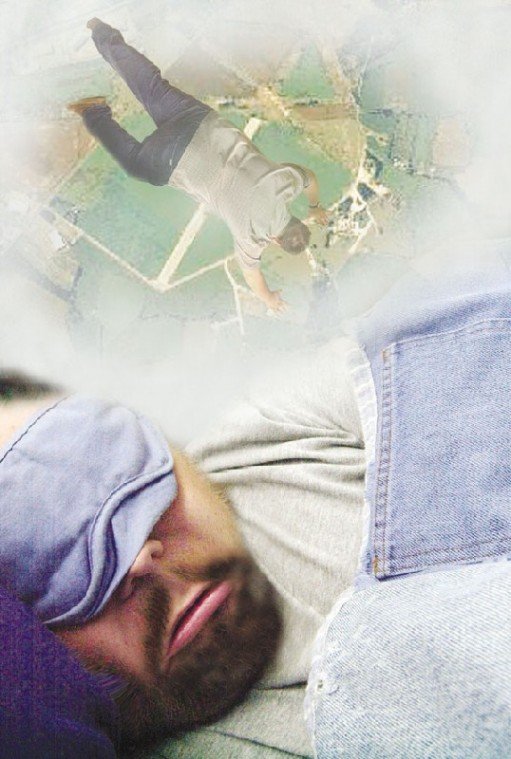She isn’t sure, but Gavilan College student Sabrina Arbizu
suspects her recurring dream of being unable to escape from her
mom, dad and brother, who have turned into monsters, is
meaningless. When she consulted a dream dictionary to decipher the
meaning, she found relating the answers to her life was a bit of a
stretch.
She isn’t sure, but Gavilan College student Sabrina Arbizu suspects her recurring dream of being unable to escape from her mom, dad and brother, who have turned into monsters, is meaningless. When she consulted a dream dictionary to decipher the meaning, she found relating the answers to her life was a bit of a stretch.
Arbizu, 19, last dreamt the dream about five years ago. She’s since given up on uncovering any deeper significance.
Dream dictionaries such as Arbizu’s – as well as audio tapes, Web sites and entire professions, for that matter – are dedicated to the so-called science of dream interpretation.
According to some clinical psychologists, most dreams hold little or no significance and simply are the brain’s way of keeping house. Other psychologists, however, insist every dream, vivid or not, has some sort of deeper implication that can provide guidance in life.
“Most psychologists today believe when we have a dream, it’s the brain’s way of taking the information of the day, which is stored in the hypocampus, and deciding what it wants to keep in the short-term versus long-term memory,” said Nancy Bales, a psychology and sociology professor at Gavilan. “It’s like our brain is trying to understand it all and figure it out. Dreams are incredibly personal, and they mean what you think they mean. The only thing that matters is what it means to you.”
Although Bales believes most dreams are arbitrary, the Dream Doctor, also known as Charles McPhee, disagrees.
McPhee hosts the nationally syndicated Dream Doctor Radio Show, airing Sunday through Thursday nights in the Salinas, Monterey and Santa Cruz areas.
According to McPhee, every dream has some sort of meaning, and many common dreams have universal themes. Falling, for example, reflects feeling out of control or unstable, he said.
And that infamous dream of being naked in public?
Most likely, according to McPhee, the dreamer fears feeling exposed, vulnerable or unprepared for what life might throw at him or her next.
If people dream they can fly, they’re trying to reach a new destination in life, and if they dream of drowning, they’re emotionally overwhelmed, he said.
“Dreams are reflections of thoughts, feelings and awarenesses of events in our lives,” he said. “It’s obvious from the evidence and conclusive from the evidence that there are universal symbols that we all share in our dreams.”
While the majority of dreams are bits and pieces of random information that likely don’t have symbolic meaning, dreams that repeat themselves over time might hold more significance, Bales said.
But before running off to a therapist or self-billed dream interpreter, Bale recommended dreamers study the repetitive dreams in relation to their lives and try to uncover the meaning themselves.
“Usually, you can figure that out yourself if you step back and look at what’s happening in your world,” she said. “If you can’t, then go to a licensed therapist, because they can look at the psychological aspects. Also, they can give you an objective perspective and see the things you might be overlooking.”
Dreams can occur in any one of the four stages of sleep, but the most vivid and memorable dreams occur in the last stage, also known as rapid eye movement or REM, Bales said.
Typically, the sleep cycle repeats about four or five times a night, and even though the body is paralyzed while dreaming, involuntary responses such as quickened breathing and heart rate still occur.
Many psychologists say dreaming is necessary for mental health, and though some people swear they don’t dream, they actually just don’t remember the next morning what took place in their minds, Bales said.
“Everyone dreams. If you didn’t dream, you’d start becoming delusional,” she said. “Many times, we don’t wake up right after REM sleep, so we don’t remember what we dreamt. But when we wake up later and open our eyes, there’s so much other stimuli going on that we forget that story in the dream, unless it is repetitive.”
Eileen Pickel, a 49-year-old Gilroy business owner, said she only has recurring dreams after a loved one, especially a relative, dies.
A few weeks after the death, Pickel said the deceased will appear in her dreams as if he or she were alive.
“It’s almost like they’re coming back to tell me everything is going to be OK,” Pickel said. “I remember those dreams because they’re so emotional. But other times, I’ll just remember the dreams because they’re so wacky. I mean, if I dream about being in Hollywood, what does that mean? That my life is boring? I don’t think it means anything, really.”
Arbizu, the Gavilan student, has resigned herself to skepticism as well. Even so, she said, she wasn’t planning to get rid of the dream dictionary.













